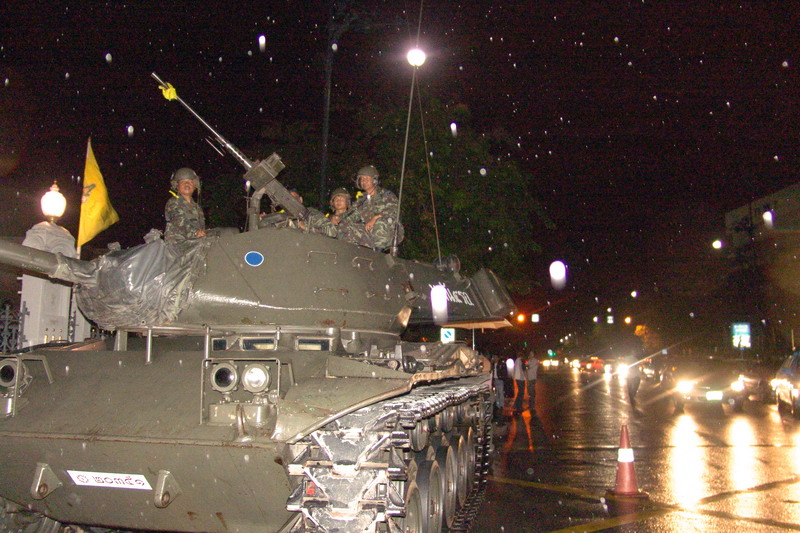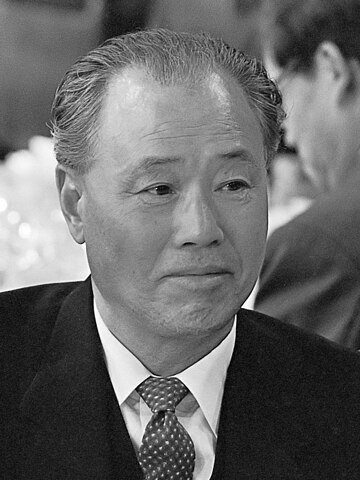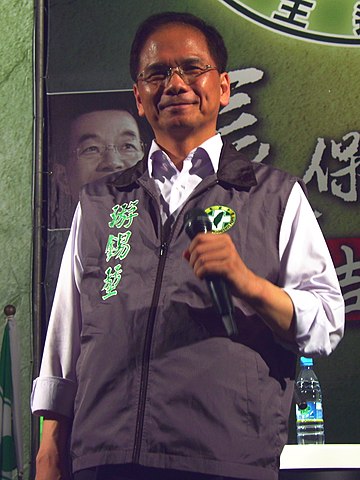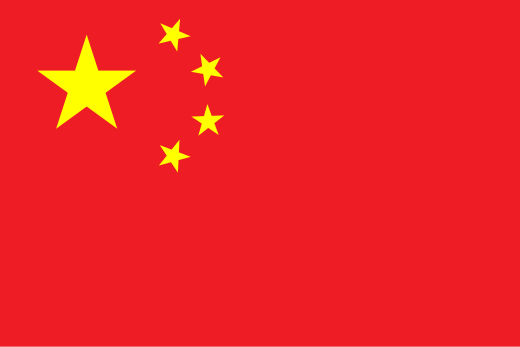Wan Li served as the Chairman of the People's Republic of China for a brief two year period. While he was entitled to serve the remainder of Dai Xianglong's 6 year term of office, he felt it unseemly to support such a factor.
After extensive conversations with President Bush in the United States, Chairman Wan announced that elections would be held in early 2004, and the winner would serve the remaining four years of his term. This was accepted by the Congress of the People's Republic in a small formal vote, and Wan Li settled in to fulfill his duties as Chairman.
Some of the first policies undertaken by the Chinese government was to push hard on Islamic imams proliferating what they considered to be "seditious radical ideologies", and completely banned immigration from Islamic states into China barring "certain persons applying for refugee status." -- this policy was criticized in some neutral states, but not many openly objected due to large scale of fear and terror that had been rife across the globe.
In the time between April 2002, and the start of
Operation Hammer of Dawn in September 2003, the geopolitical world stage changed quite rapidly. the People's Liberation Army, and the Chinese special services stepped up their intelligence campaigns in Africa, leading to the overthrow of the right-wing populist regime in Zaire in June, and the installation of a pro-Chinese "soft socialist" government, similar to the rest of Eastern Africa.
Emphasizing the growing spectre of radical terrorist elements, a wave of Islamism spread through out the Middle East. where as in states such as Morocco, Algeria, Tunisia, Libya and Egypt, no such efforts materialized, Sudan was one of the first nations to feel the heat, along with Yemen, Oman and the IC's neighbors in the Arab peninsula.
From July - October 2002, the government of Sudan collapsed in favor of an Islamist regime. To protect the Christians of the region, China stepped in and occupied Southern Sudan, formally bolstering the rebels they had backed -- the declaration of the Sudanese People's Republic had followed, showing full independence for the South Sudanese nation.
In the later months of 2002, the Islamist uprisings had swept through the Arab peninsula, engulfing Yemen and the smaller states under IC control; save for Oman, whose Ibadi militant government had joined the IC's alliance and had maintained their independence -- if only nominally.
Outside of Sudan and the Arabian Peninsula, the wave of IC sentiment caused the toppling of governments in Chad, Niger, Burkina Faso, Mali, Mauritania, and Senegal; all of whom declared themselves in "fraternity with the House of Islam in it's struggle against Chinese, American and Soviet imperialism," and vowed more attacks in the coming months.
While the Americans continued to plan their method of operations against the IC, the Chinese had made no such long-term plans, and had simply began to pummel the Islamic Caliphate and her allies with aerial attacks. Between Christmas 2002 and Easter 2003, China had dropped thousands of bombs over the Islamic Alliance's territory, and had killed hundreds of militants.
The Soviet Union's commitment to the conflict escalated after the IC detonated a car-bomb outside the Soviet embassy in Damascus and attacked a nightclub there as well. The secular dictatorship of Bashar al-Assad maintained a harsh response against the terrorists, and a number of Soviet agents joined in and, with American permission, began to stage bombing raids into Arabia from American allies Jordan and Iraq.
The unbottling of the nuclear genie showed itself once again in September 2003. The United States government announced it was ready for a "full measure of response" against the forces of Islamic terrorism. President Bush stated that, "
the radicals of this faith have killed thousands of people world-wide through nuclear and biological terrorism. We cannot allow this to stand, and so we must strike in response."
The nuclear genie had been uncapped in 1999 after India and Pakistan had turned upon each other and turned each other to nuclear ash. The genie would return, humans admitted, because well, once we had a taste of the evils, how could we ever deny such things again?
The United States, during the early Cold War, out of general concern over the future of utilizing nuclear weapons, instituted a policy of "mutually assured destruction". However, after the 1999 Kargil War, the three major superpowers had coordinated a new nuclear doctrine -- retalliation, at least in a tactical sense, would be the order of the day for those launching nuclear attacks. However, terrorism hadn't been entirely covered, and in the year since the May attacks, the three superpowers leaders had debated over the proper proportion of response. Nobody wanted to turn Mecca or Medina into a total parking lot, that would've simply just turned into a whole mess of problems elsewhere.
In September 2003, the Islamic Caliphate cut a large swath through the heart of Jordan, and attacked Israel, the situation escalated significantly. The Islamic Caliphate, using aeroplanes seized from the runways of Jordan, began to pummel Jerusalem and Tel-Aviv, indiscriminately bombing whatever they could reach. This threw off the time-table set up by the three allies.
The three superpowers were further troubled when the Islamic Caliphate pushed heavily into Israel, threatening Jerusalem. Israel's government warned to the three powers that the Islamic Caliphate's invasion wouldn't be tolerated in the slightest, and that disasterous repercussions would follow. This warning went a little further than the three superpowers, coherently forming a general "warning" to the Islamic World -- if the IC didn't cease their invasion, bad things would follow.
The first use of nuclear weapons in the Islamic War was a tactical Israeli detonation in the West Bank, destroying a main highway intersection that lead into Jerusalem. This attack was undertaken during a number of Islamic Caliphate convoys moving into the area. At least 800 jihadis were killed in the explosion, and it marked the total uncapping of the nuclear genie once more.
Israel once again reiterated their willingness to use nuclear weapons on a greater scale, should the forces of the Islamic Caliphate insist on their war. While Israel refused to utilize tactical or strategic nuclear weapons against the Jordanian population or state (they //were// their allies, mind you), they had no qualms about targeting any city in Arabia, and they made that clear.
In the following days, the Israelis managed to push the Islamic Caliphate back several miles from Jerusalem, and a summit of a few neighboring nations was called together. Israel, Egypt, Lebanon, Syria, Libya, Iraq and Kuwait (which was a government-in-exile) met in Tel-Aviv to discuss the affairs. The Arab/Islamic nations expressed their concerns about Israel's threat to utilize nuclear weapons, and sought guarantees that Mecca and Medina would not be targeted.
Similarly, Israel expressed concern that none of the states that had called the meeting had deployed troops to help Israel out (save for Iraq and Kuwait, whom were involved in their own warfare against the IC.) -- the Israeli government, largely governed by liberals and leftists, made clear that they wanted peace and cooperation with the Palestinians and the Arab world. The last time Israel and the Arab world had gone to war, 1948, the West Bank and Gaza had been under Arab control, and Israel had largely respected that.
The meeting soon moved from a simple summit of concerns into a serious debate on the matters of the future of the Middle East -- if the Islamic Caliphate was blown into nuclear ash by the superpowers and Israel, how would reconstruction afterwards look -- a number of Egyptian, Syrian and Israeli representatives suggested seriously the establishment of a framework to establish a confederation of united states in the Middle East, to join together what time has largely driven apart.
The Israeli prime minister, Avraham Burg, was one such proponent of the idea. The
Democratic Front and their coalition largely consisted of adherents to the doctrines of the prevalent communist ideologies in the People's Republic of China and Soviet Union, along with left-leaning liberals and "peaceniks", who sought a proper solution to the issues raised with the 1948 war.
From September 2003 to December 2003, the "Levantine Summit" frequently met in Tel-Aviv, or in other times, Cairo, Damascus, or other cities. The first settlement reached by the nations, was the formation of a "common cause alliance" between the signatory nations, aimed on defeating the Islamic Caliphate and "purging radicalism from the world". Egypt, Syria and Lebanon soon began to freely pool soldiers of Islamic faith to be used by the powers aligned against the Islamic Caliphate -- they knew that Mecca and Medina would have to be taken by force of arms, and they didn't want it turned into nuclear glass.
As a result of this war, in the Middle Eastern theatre, either for training or preparations for Operation
Olympic, numerous countries began to form Islamic-only regiments. The
United States, at the suggestion of many organizations, formed many divisions, including the
Muhammad Ali Division, comprised of American adherents to Sunni or Shiite Islam, Nation of Islam, as well as expeditionaries from American allies such as Morocco, Turkey, Iran, and Nigeria (plus a few soldiers from the pools made available by the framework).
The
Soviet Union fielded several divisions, largely comprised of Tatar Muslims, Turkic Muslims, Kazakhs, Dagestanis, Circassians, Chechens, Libyans, Egyptians, Algerians, Syrians and Lebanese.
The
People's Republic of China fielded several divisions as well, comprised of Bangladeshis, Kashmiris, Malay Muslims, as well as China's own domestic Muslims, largely from Xinjiang and neighboring regions in that area.
The large-scale collection of forces began to prepare for large-scale operations in the Islamic Caliphate effective 2004, and the many powers agreed on tactical and "light strategic" targets to hit. Gaining the support of the moderate Shiite regime in Iran, they began the process of throwing together the last remnants of the necessary "plan of action".
The Chinese "interim election" was held on January 8, 2004. A large number of candidates took the field, even beyond the "establishment" candidates. The issues were lightly touched upon, as most candidates supported the course of action being taken against the Islamic Caliphate's warmongering. The election boiled largely down into who would win the war more effectively, and who would be a stronger leader for the time being in the "Reconstruction" period.
When the election results came around, the party that gained the largest share of votes was outside of the traditional power blocs, the typical Pan-Blue, People's Party, Revolutionary KMT, Communist Party "quad-party system" was fractured with a number of Progressives and Liberals forming their own bloc party, largely breaking off of the RKMT and PPC's power blocs.
Yu Shyi-kun, the Governor of Taiwan in the late 90s, had been a large-scale advocate for "environmental sense, economic sense, and international sense". The "Three Senses of the People" had picked up a ring similar to Sun Yat-sen's "Three Principles of the People", upon which the first republic of China had been established, and upon which even the People's Republic had found itself rooted in.
The
Democratic Progressive Party took command of the office of Chairman effective February 1, 2004, and with it, China set a course for the end of a dangerous, and bloody war. And on February 2, the gates of hell opened.


